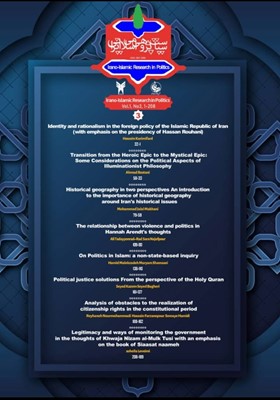Investigating the relationship between violence, war, and politics with an emphasis on Hannah Arendt's thoughts
Subject Areas : Political Developments in Iran
ali TadayyonRad
1
*
,
Sara Najafpour
2
![]()
1 - assistant professor, shahid chamran university of ahvaz. Ahvaz, Iran
2 - assistant professor, shahid chamran university of ahvaz. Ahvaz, Iran
Keywords: Totalitarianism, Violence, Revolution, Action, Arendt, Political,
Abstract :
The definition of politics from a realistic point of view is always mixed with deceit and often far from any moral idea. In today's world, this definition is undoubtedly a guide for many politicians and activists, who believe that in the constant conflict, which is often mixed with violence, one should seize their own interests. In today's world, where all the chaos, war, and violence happen in the name of politics, some political and moral activists have sometimes decided that politics should be seen from a human, moral, peaceful, and friendship perspective and that politics is not violence. Among these controversies, the meaning of politics and its relationship with violence still seems vague and their relationship is an issue. In this research, we tried to address the issue of "the relationship between violence and war and politics" and to answer the question, what is the relationship between violence, war, and politics? For this purpose, we focused on Hannah Arendt's opinions and investigated the main topic of the research with a descriptive-analytical method.Our study shows that Hannah Arendt presents a definition of politics based on existentialist intellectual foundations. From his point of view, politics is the result of rationality, speech, initiation, motivation, being with others, and dialogue. Arendt sees politics as an act of speech and human interaction in the public arena, which has no relation to violence and is in contrast to it. Where violence begins, politics ends.
_||_

